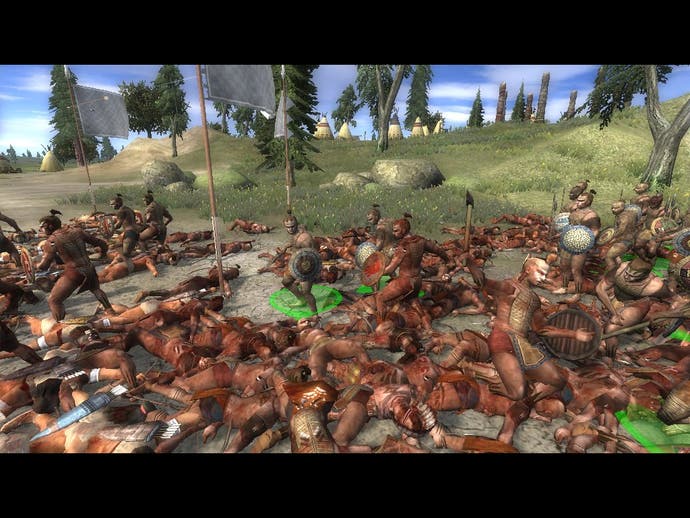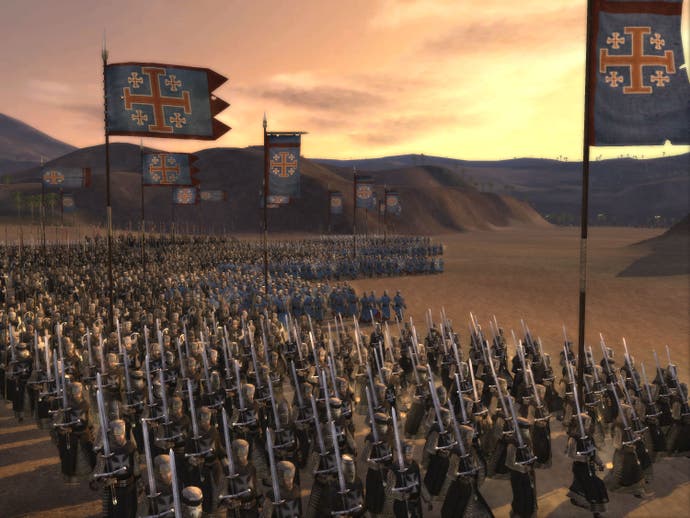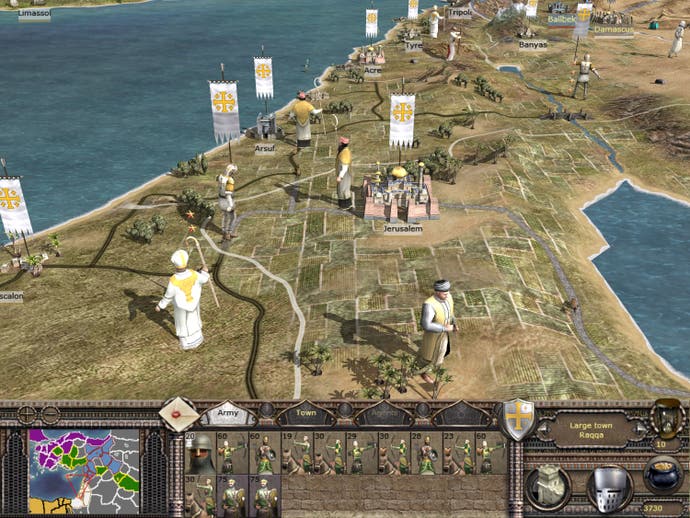Medieval II: Total War Kingdoms
Coming to America. And Lithuania.
If someone walked up to you in the pub and offered you control of a country for a fiver, you'd probably have some questions you'd want to ask. Like - say - what's wrong with it? "Oh, nothing. Nothing at all," he'll explain. "I mean, there may be a bit of a war on but..."
What kind of war, you'd ask, noting the hesitation.
There's a pause before a sheepish admission: "Well... kind of a total war."
And then you'd say yes. Especially if you hear it's four kingdoms for fifteen quid from certain online retailers.
With Empire: Total War announced, Kingdoms basically exists to help tide us over until Creative Assembly finish assembling their creation. To that end, it's quite the collection. Where most add-ons give one campaign, this goes for four. Crusades (set around the third Crusade), Teutonic (last Pagan nation of Lithuania versus German knights), Britannia (the United Kingdom in a highly un-united state - rumble!) and Americas (some day you will find the cities of gold... and fight over them) and... oh, this seems a bit familiar, yeah?
Since our first impressions a month or so back almost morphed into a full review - which is what happens when the preview code is of a full game, and basically fully functional - I'd recommend everyone reading that as well as this. In fact, I insist. Everything I said in there is still true, and all good reasons why Total War fans should totally get this. In fact, because that's so positive, I'm going to pretty much concentrate entirely on my reservations with extended play - and that they're relatively unreasonable reservations should say much.
Seriously, read this againand return to my petulant whining.
Okay - obvious stuff. The AI won't satisfy the hardcore, though it does the job well enough in most situations. There's some odd control stuff in Medieval II - charging doesn't seem as instinctive as it was in previous versions, and it remains so here. When the pieces automatically move around the map following orders, you really should be able to mouse-over them to discover what they were rather than relying on memory. Usual Total War bugbears, basically.

In fact, it's the usual bugbears which are highlighted at moments in the four campaigns. Most noticeably, the American campaign which is about the conquering of the new world. Unlike something like Civilization, which can be about deeply asymmetrical warfare (tanks versus cavemen, if you're ultra-rubbish), Total War - while the tech differences undoubtedly matter - it's not quite as extreme. They're normally between two civilisations in the same broad "age", in Civ terms. The problem comes when you're having a side which functionally isn't - what do you do? The main problem isn't actually balance. The American Campaign primarily pitches the Old Worlders against New Worlders, with one having numbers and the others having technology. That's fine. The problem comes in playing the New Worlders.
This is best shown by playing the Apache tribes. Apaches don't build castles. They don't build walls, though can repair them in towns of places they capture. They don't get ships, making transport a bitch. They don't have horses yet - historically, of course, The Best Of All The Animals were only brought to the Americas by the non-Americans. So they're infantry only, and overwhelmingly a missile-based army. The problem with all these things which have been coded to create historical semi-realism is that it creates a limit of the tech-tree they can climb. They solve this by Total War's normal solution - we see it in old Rome games with the Legions and whatnot - of introducing the ability to make better unit types as time progresses. Which feels a bit cheap, as they're just the normal types with better stats as - well - if they changed their abilities too much, they wouldn't be the Apache anymore.

This is kind of one of the problems running through Total War games. You don't really get to change history. Sure, you can make - as I did - the Apache run rampant over the continent, but fundamentally the Apache don't change by their experiences significantly. What would Apache civilisation be like when they'd got hold of the Gold of the Incas, for example? Pretty much identical. One of the standard problems that the harder-core Total War fans have is with the quasi-fantastical units - the flaming pigs in Rome, for example - but when you severely changed history, you need that imagination to cover the holes and populate that alternate history. It matters less when it's just one bunch of European peasants hitting the other, but the more extreme America campaign makes its limitations all too clear. The Total Realism mod for Rome has a feature where rather than being able to recruit any of your units pretty much anywhere, only those in the locale are available. So if you're in Spain, you recruit Iberian soldiers. A similar system here may have been an idea, if only for variety's sake...

It's worth stressing that as much as the execution may lack in details like this, Kingdoms remains a series of re-freshening experiences. In the case of the Apache, armies of Dog Soldiers covering the hills, raining down arrows on the Aztecs like a New World Crécy, or sweeping out of the forest to engulf the embattled French are unlike anything in any other Total War game, and as such invigorating. Old mechanics are repolished, with the Apache's Warpath functioning much like a Crusade. The other sides have their charms. The Aztec's human sacrifice is lovingly detailed and completely different from the tiny Spanish forces and their heavy dependence on the local mercenaries. Alongside its unusualness, the different characters of the factions is the America campaign's greatest strength. Some may eventually grow a little repetitive, but the familiarisation of the new is a kick.
And this is Kingdoms at its worst. The Crusades and the Teutonic campaign fight it out for being the main act, both playing to the core design of Medieval while having enough character to justify playing again (And seriously - I repeat from the first impressions - the Greek Flamethrowers are at least eighteen kinds of splendid). Seriously, I really, really mean it - go read all this again and feel excited.
In fact, I will too. Let's go together.
1.
2.
3.
Woah. That sounds great. I'm going to go get me one now.









